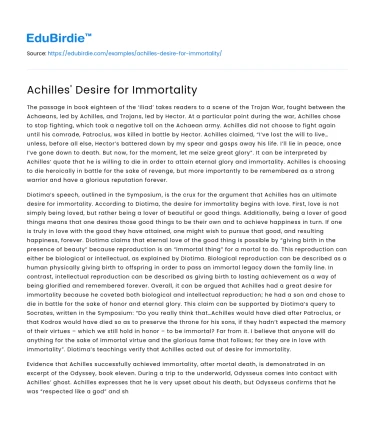The passage in book eighteen of the ‘Iliad’ takes readers to a scene of the Trojan War, fought between the Achaeans, led by Achilles, and Trojans, led by Hector. At a particular point during the war, Achilles chose to stop fighting, which took a negative toll on the Achaean army. Achilles did not choose to fight again until his comrade, Patroclus, was killed in battle by Hector. Achilles claimed, “I’ve lost the will to live…unless, before all else, Hector’s battered down by my spear and gasps away his life. I’ll lie in peace, once I’ve gone down to death. But now, for the moment, let me seize great glory”. It can be interpreted by Achilles’ quote that he is willing to die in order to attain eternal glory and immortality. Achilles is choosing to die heroically in battle for the sake of revenge, but more importantly to be remembered as a strong warrior and have a glorious reputation forever.
Diotima’s speech, outlined in the Symposium, is the crux for the argument that Achilles has an ultimate desire for immortality. According to Diotima, the desire for immortality begins with love. First, love is not simply being loved, but rather being a lover of beautiful or good things. Additionally, being a lover of good things means that one desires those good things to be their own and to achieve happiness in turn. If one is truly in love with the good they have attained, one might wish to pursue that good, and resulting happiness, forever. Diotima claims that eternal love of the good thing is possible by “giving birth in the presence of beauty” because reproduction is an “immortal thing” for a mortal to do. This reproduction can either be biological or intellectual, as explained by Diotima. Biological reproduction can be described as a human physically giving birth to offspring in order to pass an immortal legacy down the family line. In contrast, intellectual reproduction can be described as giving birth to lasting achievement as a way of being glorified and remembered forever. Overall, it can be argued that Achilles had a great desire for immortality because he coveted both biological and intellectual reproduction; he had a son and chose to die in battle for the sake of honor and eternal glory. This claim can be supported by Diotima’s query to Socrates, written in the Symposium: “Do you really think that…Achilles would have died after Patroclus, or that Kodros would have died so as to preserve the throne for his sons, if they hadn’t expected the memory of their virtues – which we still hold in honor – to be immortal? Far from it. I believe that anyone will do anything for the sake of immortal virtue and the glorious fame that follows; for they are in love with immortality”. Diotima’s teachings verify that Achilles acted out of desire for immortality.
Save your time!
We can take care of your essay
- Proper editing and formatting
- Free revision, title page, and bibliography
- Flexible prices and money-back guarantee
Evidence that Achilles successfully achieved immortality, after mortal death, is demonstrated in an excerpt of the Odyssey, book eleven. During a trip to the underworld, Odysseus comes into contact with Achilles’ ghost. Achilles expresses that he is very upset about his death, but Odysseus confirms that he was “respected like a god” and should not be “bitter” about his death. The affirmation Achilles wanted about his reputation, while still alive, validates the desire he had to achieve immortality through intellectual reproduction. Next, Achilles asks about his son, Neoptolemus. Odysseus explains that Neoptolemus: “…never paused in the great throng of battle; he was always fearlessly running forward, and he slaughtered enormous numbers in the clash of war. No sharp bronze spear had wounded him at all; he was unhurt by all the skirmishes endured in war”.
Then, Achilles’ ghost “took great strides across the fields of asphodel, delighted to have heard about the glorious prowess of his son”. The body language of Achilles provides evidence he is happy and confident to have achieved virtuous immortality through biological and intellectual reproduction. Achilles successfully obtained his goal of having a glorious reputation forever through being a great warrior, and father. As a result, Achilles ultimately acquired immortality.






 Stuck on your essay?
Stuck on your essay?

